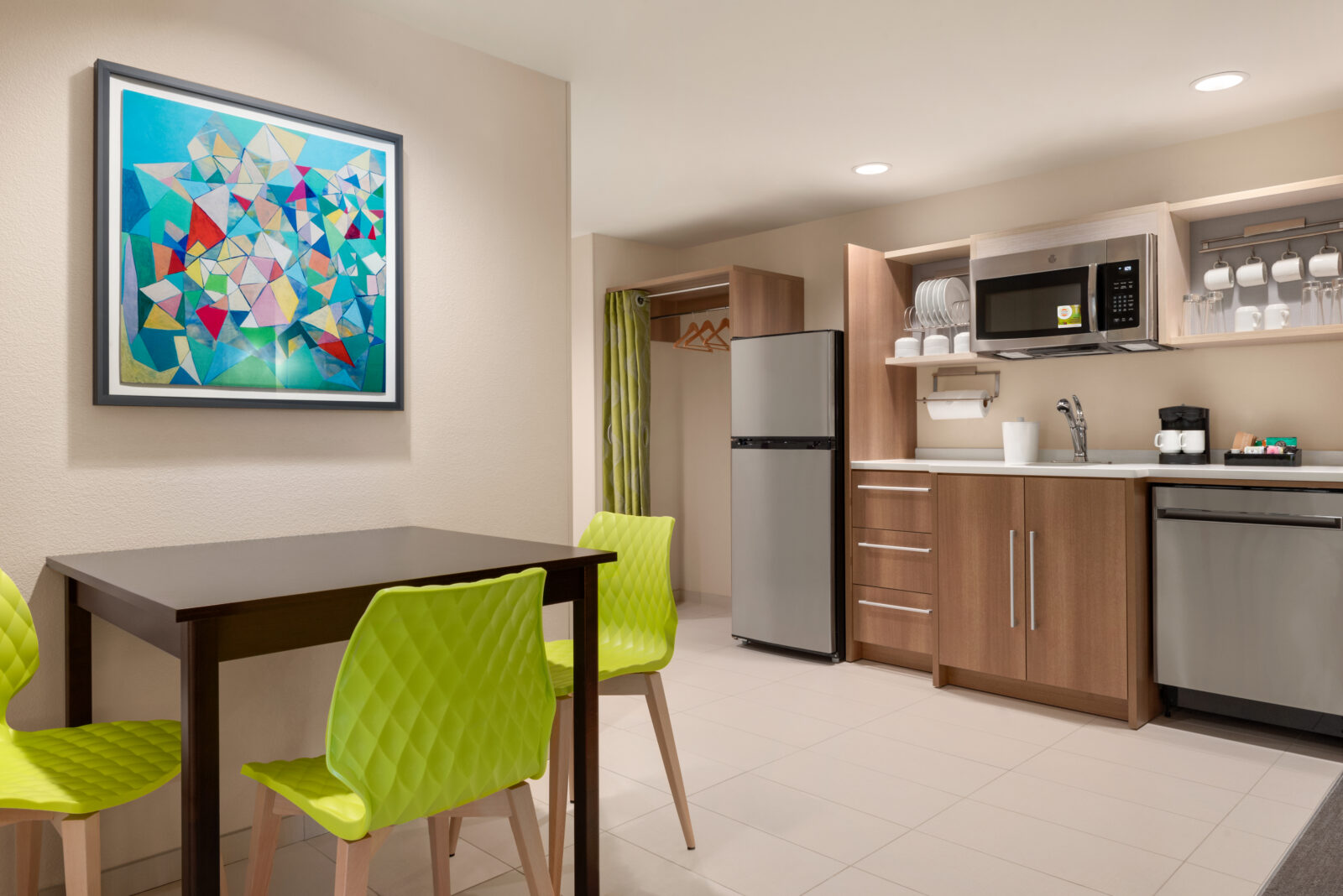[This is a story we wrote for, and which first appeared on NBC News in a slightly different form]

Courtesy Home2 Suites by Hilton
Extended Hotels are having a moment
As travel picks up and the phenomenon of remote work continues to blur the lines between business and leisure, extended-stay hotels are having a moment.
Last year, the average occupancy rate for extended-stay properties climbed to 73% percent, compared to just 56 percent for hotels in general, according to data from STR, a research firm. Now, big hotel operators and real estate developers are investing heavily to make that moment last.
“There is a definite blurring of business and leisure that includes longer stays since employees can work from anywhere,” says Daniel Finkel, chief commercial officer for TripActions, a corporate travel service.
That blur has turned Airbnb and some other vacation rental companies into money-minting machines. During an earnings call last week, Airbnb CEO Brian Chesky told investors that 2021 was the company’s “best year in history.” He also described the changing landscape: Over the past two years, the average stay increased by 15 percent. Stays of a week or more now represent half of all nights booked, and long-term stays of 28 nights, or more, have become Airbnb’s fastest-growing type of booking.
The hotel industry has heard the message
Although extended-stay hotels still account for less than 10 percent of the total lodging market, their share has been growing, according to STR. And nearly every major hotel brand is adding, or has announced plans to add, properties that cater to travelers looking to stay awhile. Chains such as Extended Stay America, Homewood Suites by Hilton, and Residence Inn by Marriott, for instance, are light on amenities, but typically offer more space, full kitchens or kitchenettes, and lower rates than full-service hotels.
Wyndham Hotels & Resorts, which already operates the mid-priced Hawthorn Suites chain, plans to launch its first economy-level, extended-stay brand this spring. CEO Geoff Ballotti announced the launch last week during an earnings call with investors, where he described the extended-stay market as “recession and pandemic proof.”
“I see it (extended stay) as one of the fastest-growing and one of the most exciting segments in the hospitality business,” said Kevin Davis, Americas CEO for the hotels and hospitality division of JLL, a commercial real estate service company. “The sector has attracted a tremendous amount of investor interest.”
In January, real estate heavyweights, Blackstone Inc. and Starwood Capital Group, which includes nearly a dozen hotels brands, together ponied up $1.5 billion for more than 100 properties from WoodSpring Suites. That deal came just a couple of months after the pair paid more than $6 billion for Extended Stay America, with more than 650 locations across the country.
What’s the attraction?
What’s the attraction? For 2019, the last ‘normal’ year for the industry, the average profitability for all full-service U.S. hotels was 27 percent, according to Carter Wilson, senior vice president of consulting for STR. “But it is not uncommon to see extended-stay properties putting 40 percent to 50 percent to the bottom line,” he said, even though prices are low.
A five-night stay at Extended Stay in Minneapolis, for instance, starts at about $75 a night. Marriott’s Residence Inn, one of the higher-priced, extended-stay options, costs $111 a night.
But fewer amenities and longer stays mean operating costs are lower, too. Housekeeping is typically offered once a week, rather than every day. Room service, if available at all, is limited. No one is restocking the minibar or replacing the coffee pods, and with fewer guests coming and going, the front desk requires fewer workers.
Peter Caputo, a senior hospitality executive with Deloitte, thinks the luxury equation could change, as the market expands, and new players come in. Even full-service hotels have been seeing more travelers who stay for a week. “People are used to having more space at home and now that they’re back traveling, road warriors will want more space and more upscale amenities wherever they are staying. Much like boutique hotels might offer,” Caputo said.
WhyHotel, for instance, turns apartments that are yet to be leased into temporary hotel rooms available for extended stays. The start-up has properties in a handful of cities, including Nashville, Tennessee, where a two-week stay starts at $160 per night for a studio. Prices are higher in New York City and Miami.
Pets getting the extended stay treatment too
Some hotel operators are looking to cash in by appealing to the needs of a different type of traveler altogether: one that often has four legs. Hilton WorldWide Holdings, for instance, recently made its extended-stay properties 100 percent pet-friendly. Pet fees at the company’s Homewood Suites and Home2 Suites start at $50 per stay. Hilton has also partnered with the pet food giant Mars Petcare to offer on-call pet experts who can answer guests’ questions on pet health, wellness, and behavior.
That could be a selling point for millions of pet owners, who have yet to road-test the new companions who entered their lives during the pandemic.
Thanks for visiting Stuck at the Airport. Subscribe to get daily travel tidbits. And follow me on Twitter at @hbaskas and Instagram.